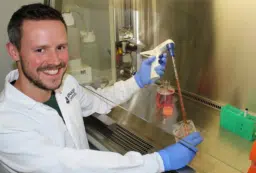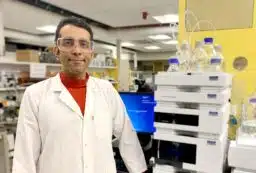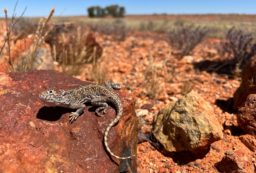Probiotics not always the right approach
Millions of women around the world have probably used yoghurt as a folk remedy to prevent thrush while taking antibiotics. A Melbourne GP and PhD student has proven that Lactobacillus acidophilus, a key bacterium in yoghurt, was not effective in the prevention of thrush (‘vulvovaginitis’) after antibiotics.
Her findings were published today in the eminent British Medical Journal (BMJ). “It’s a reminder that all medicines, even natural ones need to be tested,” says Dr Marie Pirotta.
235 Melbourne women took probiotic (containing lactobacillus bacteria) or placebo
preparations orally or vaginally until four days after completion of their antibiotic course. They recorded any symptoms and provided vaginal swabs for analysis. The results were so clear cut that the trial was cut short on ethical grounds.
Dr Pirotta was surprised by her results, given that the folk remedy was so popular with women, including her own patients. “But at least now women can be better informed and can choose to use effective treatments instead,” she said. “Currently, there are no recommended medicines to prevent thrush, so women should discuss their options with their health care providers.”
Around 50% of women will suffer a bout of thrush after antibiotics at least once in their lifetime. Although thrush usually does not kill people, it does have a big impact on women’s physical and emotional wellbeing, as well as on their relationships. In 1995 the costs associated with diagnosing and treating thrush in the United States were $US1.8 billion (1).
The clinical trial was instigated after Dr Pirotta’s earlier research that found that around 40% of women had used yoghurt or Lactobacillus to try to prevent or treat thrush after antibiotics. These women also reported that they were concerned about getting thrush after antibiotics, and for a small number, the concern was so great that they would choose not to take the antibiotics (2).
She also found that more than two thirds of GPs and pharmacists that she surveyed thought that oral yoghurt or Lactobacillus could be effective to prevent thrush after antibiotics and they had recommended this therapy to women when prescribing or dispensing antibiotics.
Dr Pirotta said that “complementary therapies probably have a lot to offer in health care. It was disappointing to find that this type of Lactobacillus was not effective in this case. But this is a reminder that all medicines, even ‘natural’ ones, need to be tested, and wherever possible, treatments should be based on evidence.”
“This simple and relatively inexpensive study will change how GPs advise women about thrush prevention,” says Professor Michael Kidd, President of the Royal Australian College of General Practitioners. “It demonstrates that research in general practice can help GPs deliver the best, most cost effective and evidence based care. We need to invest more in this kind of targeted medical research.”
Dr Pirotta was one of 15 early career scientists selected to take part in the 2004 Fresh Science Awards held recently in Melbourne. The one who most meets the program requirements will win a study tour of the UK courtesy of the British Council Australia.




 Fresh Science is on hold for 2022. We will be back in 2023.
Fresh Science is on hold for 2022. We will be back in 2023.